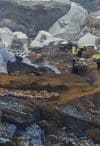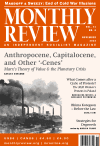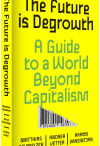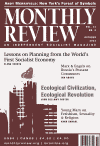Global

This month’s “Notes from the Editors” marks the 30-year anniversary of the United Nations Framework Convention on Climate Change. The abject failure of this framework to enact meaningful progress on the planetary crisis continued to be on full display in 2022, including at November’s COP27 in Egypt. | more…

This issue’s Review of the Month discusses Marx’s role as the foremost revolutionary critic of bourgeois Enlightenment humanism. To this day, his conception of “the universal metabolism of nature” remains a powerful antidote to the phantasmagoric “dark ecology” posited by today’s posthumanism. | more…
![NATO und Totenkopf [NATO and Skull]](https://monthlyreview.org/wp-content/uploads/2023/01/Nato-Morder-100x146.jpg)
The global balance of power shifting. The resistance to NATO’s push for a New Cold War is growing, particularly among the Third World countries that have historically borne the brunt of the West’s imperial projects. It is the role of socialists living in the imperial core, Paweł Wargan writes, to support the peoples of the Third World as they rise up in the new era. | more…

Pyotr Kondrashov takes a deep dive into Lenin’s understanding of social dialectics. This exploration gives rise to an approach to that places the active human subject squarely in the center of a revolutionary Marxism that goes “beyond Marx,” furthering the struggle for a liberated society. | more…

John Bellamy Foster takes readers back to Marx’s understanding of the dialectics of nature and society. As Marx and Engels noted, humanity must not only struggle for the advancement of human freedom, but also the capitalist destruction of the earth. Today, the struggle for freedom and the struggle for necessity coincide everywhere on the planet for the first time in human history, creating a prospect of ruin or revolution. | more…

The crypto winter, Ramaa Vasudevan writes, is here. Cryptocurrency, far from being a democratizing force in finance, has led to only further concentrations of wealth and power and increased precarity within the financial sector. The recent fall of Sam Bankman-Fried is only the beginning. | more…

Arianto Sangadji traces the relationship between the state and mining capital in Indonesia throughout the historical capitalist development of the country from Dutch colonialism to the contemporary practices of multinational mining corporations. While these powerful firms have generated significant profits, they are also associated with dispossession, environmental degradation, and ruthless labor exploitation, spurring resistance from the local populations. | more…

The latest Review of the Month, written by Spanish geologist Carles Soriano, considers the implications of idea of the Capitalocene, the historical determinations affecting the study of the Earth Sciences, and how our views of the current planetary crisis are often shaped by inadequate narratives. Current approaches, he writes are “non-dialectic and non-materialist regarding the study of social reproduction modes, and this renders the whole understanding of the planetary crisis not only incomplete but idealist, for the capitalist mode is assumed as absolute rather than historical.” | more…

The perception that we are living in a critical historical period regarding the conditions of habitability on Earth—not only for humans but for many other living organisms too—is gaining more and more adepts among common people, academics, politicians, and social movements. This critical period has been typified as the planetary crisis of the Anthropocene Epoch and studies undertaken in the present century show that habitability on Earth is progressively deteriorating. | more…

Mariko Frame reviews The Future is Degrowth: A Guide to the World Beyond Capitalism, by Matthias Schmelzer, Andrea Vetter, and Aaron Vansintjan (Verso, 2022) and its explorations of the policies, vision, and strategies for social change required for the burgeoning movement. | more…

This year is the fiftieth anniversary of The Limits of Growth, one of the most influential, and also controversial, environmental studies ever written. No other environmental work of the 1970s offered such a direct challenge to the underlying assumptions of capitalist neoclassical growth economics, or was responded to so vehemently by establishment thinkers. | more…

An Ecological Marxist Perspective
How are we to understand the origins and historic significance of the concept of ecological civilization? What is its relation to ecological Marxism? And how does all of this relate to the worldwide revolutionary struggle aimed at transcending our current planetary emergency and protecting what Karl Marx called “the chain of human generations”—along with life in general? | more…


![NATO und Totenkopf [NATO and Skull]](https://monthlyreview.org/wp-content/uploads/2023/01/Nato-Morder-100x146.jpg)








